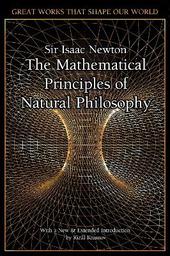
|
The Mathematical Principles of Natural Philosophy
Hardback
Main Details
| Title |
The Mathematical Principles of Natural Philosophy
|
| Authors and Contributors |
By (author) Sir Isaac Newton
|
|
Introduction by Kirill Krasnov
|
| Series | Great Works that Shape our World |
|---|
| Physical Properties |
| Format:Hardback | | Pages:480 | | Dimensions(mm): Height 234,Width 153 |
|
| Category/Genre | History of mathematics
History of science |
|---|
| ISBN/Barcode |
9781839641503
|
| Classifications | Dewey:530.1 |
|---|
| Audience | |
|---|
| Edition |
New edition
|
|
Publishing Details |
| Publisher |
Flame Tree Publishing
|
| Imprint |
Flame Tree Publishing
|
| Publication Date |
30 March 2020 |
| Publication Country |
United Kingdom
|
Description
Often known as the Principia, this one of the most important scientific works ever to have been written and continues profoundly to impact on modern science. It states Newton's Laws of Motion and Law of Universal Gravitation revealing Newton as a rare genius, revolutionizing our understanding of the world around us. Mathematical Principles of Natural Philosophy, often known as the Principia, is one of the most important scientific works ever to have been written and has had a profound impact on modern science. Consisting of three separate books, the Principia states Newton's laws of motion and Newton's law of universal gravitation. Understanding and acceptance of these theories was not immediate, however by the end of the seventeenth century no one could deny that Newton had far exceeded all previous works and revolutionised scientific thinking. FLAME TREE's Great Works That Shape Our World is a new series of definitive books drawing on ancient, medieval and modern writing. Offering a fund of essential knowledge, and spell-binding stories it satisfies every facet of human interest: scientific, philosophical, sociological, romantic, dramatic and mysterious. From the ancient wisdom of the Mahabharata to the curious power of Don Quixote, Boccaccio's Decameron and Melville's classic Moby Dick, from the scientific wonders of Isaac Newton and Albert Einstein to the great thinkers of Western and Asian philosophy. AUTHOR: Sir Isaac Newton (1642-1727) was an English physicist and mathematician who was a leading figure in the scientific revolution. His work throughout the seventeenth century provided the basis for modern science, including his three laws of motion and the law of universal gravitation. Newton s career was prolific. He was president of the Royal Society and in 1705 he was knighted, becoming the first ever scientist to receive the honour. SELLING POINTS: . New series featuring the greatest works of fiction, science, philosophy and sociology. . Foiled, embossed cover, printed on silver paper, matt laminated. . Specially written introductions contextualise the book. . New deluxe series. Hardback Deluxe edition, printed on silver, matt laminated, gold and silver foil stamped, embossed.
Author Biography
Kirill Krasnov (introduction) is a Professor of Mathematical Physics at the University of Nottingham. He received a BSc in Physics from Kiev T. Schevchenko University in 1994 and a PhD in Physics from Pennsylvania State University in 1999. He has held Postdoctoral positions at the University of California, Santa Barbara and Max Planck Institute for Gravitational Physics, Potsdam. He has been the recipient of the prestigious EPSRC Advanced Fellowship and the ERC Consolidator Grant. Krasnov is most known for his work on black hole entropy within the loop approach to quantum gravity, work on spin foam models of quantum gravity, as well as work on the renormalized volume of hyperbolic 3-manifolds. Sir Isaac Newton (1642-1727) was an English physicist and mathematician who was a leading figure in the scientific revolution. His work throughout the seventeenth century provided the basis for modern science, including his three laws of motion and the law of universal gravitation. Newton's career was prolific. He was president of the Royal Society and in 1705 he was knighted, becoming the first ever scientist to receive the honour.
|